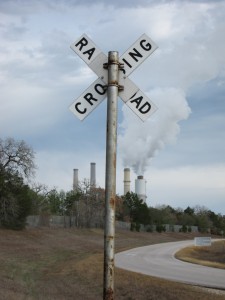Reax Roundup: Texas Crows Over Victory on EPA Air Pollution Rule
Earlier today, a federal appeals court overturned a new EPA rule, the Cross State Air Pollution Rule (CSAPR), that would have affected coal power plants in several states, including Texas.
The rule was defended in a suit from the American Lung Association, several cities and states, and several environmental groups, including the Environmental Defense Fund, Natural Resources Defense Council and Sierra Club. Fighting against the new rule were the Texas Attorney General, Texas power companies and several others.
Now the reactions are rolling in, so it’s time for another “Reax Roundup.”
First, the state Attorney General’s office says that the rules would have been especially bad for Texas:
“As the CSAPR regulations were specifically applied to Texas, the EPA’s overreach was especially onerous. First, the EPA failed to provide Texas the advance notice that is required by federal law when it did not include the State in key aspects of the proposed rule that was published in August 2010 – but then added Texas to the final regulations without notice. Further, Texas’ last-minute inclusion in the EPA’s CSAPR regulations was based upon a single air quality monitor in Granite City, Illinois – which was fundamentally flawed not only because a nearby steel mill necessarily impacted that location’s air quality, but because that very location actually satisfied federal air quality standards.”
But the Sierra Club says that the rules would do more good than harm. Mary Anne Hitt, Director of the group’s Beyond Coal Campaign, says in a statement:
“Americans have been waiting for the clean air they deserve for decades and the court’s ruling today further delays the Clean Air Act’s promise of safe, breathable air for our children.
The EPA’s long overdue and much-needed rule would have helped communities clean up their air and save lives by curbing millions of tons of air pollution that travel downwind and across state lines each year. Once implemented, the rule would have prevented as many as 34,000 premature deaths annually, avoided 19,000 hospital and emergency room visits, and improved the lives of millions.”
The Environmental Defense fund calls attention to the dissenting opinion by Judge Judith Rogers in the 2-1 ruling:
Judge Rogers vigorously dissented, arguing Judge Kavanaugh’s opinion represented a “trampling on this court’s precedent on which the Environmental Protection Agency (‘EPA’) was entitled to rely in developing the Transport Rule rather than be blindsided by arguments raised for the first time in this court.”
Judge Rogers further explained, “The result is the endorsement of a ‘maximum delay’ strategy for regulated entities, rewarding States and industry for cloaking their objections throughout years of administrative rulemaking procedures and blindsiding the agency with both a collateral attack on its interpretation of section 110(a) and an objection raised for the first time in this court.”
The Natural Resources Defense Council’s Clean Air Director, John Walke, says that EPA should appeal the ruling:
“This rule would have prevented thousands of premature deaths and saved tens of billions of dollars a year in health costs, but two judges blocked that from happening and forced EPA to further delay long overdue health safeguards for Americans.”
“The EPA can – and should – immediately appeal this decision. The dissenting judge correctly follows the Clean Air Act and prior rulings by this court. The majority opinion is an outlier at odds with the court’s own rulings as well as the Clean Air Act.”
You can read more reactions from:
- Governor Rick Perry
- Texas Commission on Environmental Quality (TCEQ)
- Electric Reliability Council of Texas (ERCOT)
Oddly enough, the EPA will now go back to the 2005 Clean Air Interstate Rule while it decides whether or not to revise the Cross State Air Pollution Rule. That previous rule was ruled unlawful in 2008 by the same court that overturned the new rule.


